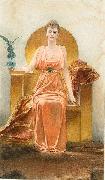Großhandels China Öl Gemälde & Rahmt Ein |
|||||||||||

|
|||||||||||
|
|
|
||||||||||||||
|
Jean-Joseph Benjamin-Constant
(also known as Benjamin Constant), born Jean-Joseph Constant (10 June 1845 - 26 May 1902), was a French painter and etcher best known for his Oriental subjects and portraits. Benjamin-Constant was born in Paris. He studied at the Ecole des Beaux-Arts in Paris, where he was a pupil of Alexandre Cabanel. A journey to Morocco in 1872 strongly influenced his early artistic development and lead him to produce Romantic scenes under the spell of Orientalism. Among his noted works in this vein are Last Rebels, Justice in the Harem (both in the Luxembourg Gallery), Les Cherifas, and Moroccan Prisoners (Bordeaux). His large canvas, The Entrance of Mahomet II into Constantinople (Toulouse Museum), received a medal in 1876. After 1880, he changed his manner, devoting himself to mural decorations and to portraits. Prominent examples include the great plafond in the Hôtel de Ville, Paris, entitled Paris Convening the World; his paintings in the New Sorbonne, representing Literature, The Sciences, and the Academy of Paris; and the plafond of the Opera Comique theatre. He was distinguished as a portrait painter, especially in England, where he was a favorite of the aristocracy. His portrait Mons fils Andra (Luxembourg) was awarded a medal of honor at the Salon in 1896. Benjamin-Constant painted Pope Leo XIII, Queen Alexandra of England (1901), Lord John Lumley-Savile, and Henri Blowitz (1902). He was made a member of the Institute in 1893, and was a commander of the Legion of Honor. He visited the United States several times, and painted a number of portraits. The Metropolitan Museum of Art in New York owns a large mural decoration by Benjamin-Constant entitled Justinian in Council. |
||||||||||||||
|
|
||||||||||||||
|
||||||||||||||
|
|
||||||||||||||
| Jean-Joseph Benjamin-Constant
(also known as Benjamin Constant), born Jean-Joseph Constant (10 June 1845 - 26 May 1902), was a French painter and etcher best known for his Oriental subjects and portraits. Benjamin-Constant was born in Paris. He studied at the Ecole des Beaux-Arts in Paris, where he was a pupil of Alexandre Cabanel. A journey to Morocco in 1872 strongly influenced his early artistic development and lead him to produce Romantic scenes under the spell of Orientalism. Among his noted works in this vein are Last Rebels, Justice in the Harem (both in the Luxembourg Gallery), Les Cherifas, and Moroccan Prisoners (Bordeaux). His large canvas, The Entrance of Mahomet II into Constantinople (Toulouse Museum), received a medal in 1876. After 1880, he changed his manner, devoting himself to mural decorations and to portraits. Prominent examples include the great plafond in the Hôtel de Ville, Paris, entitled Paris Convening the World; his paintings in the New Sorbonne, representing Literature, The Sciences, and the Academy of Paris; and the plafond of the Opera Comique theatre. He was distinguished as a portrait painter, especially in England, where he was a favorite of the aristocracy. His portrait Mons fils Andra (Luxembourg) was awarded a medal of honor at the Salon in 1896. Benjamin-Constant painted Pope Leo XIII, Queen Alexandra of England (1901), Lord John Lumley-Savile, and Henri Blowitz (1902). He was made a member of the Institute in 1893, and was a commander of the Legion of Honor. He visited the United States several times, and painted a number of portraits. The Metropolitan Museum of Art in New York owns a large mural decoration by Benjamin-Constant entitled Justinian in Council. Date 1893(1893) Medium Oil on canvas cjr |
||||||||||||||
|
Related Paintings to Jean-Joseph Benjamin-Constant :. |
||||||||||||||
|
|
||||||||||||||
|
|
||||||||||||||
|
KONTAKTIEREN Sie UNS |







